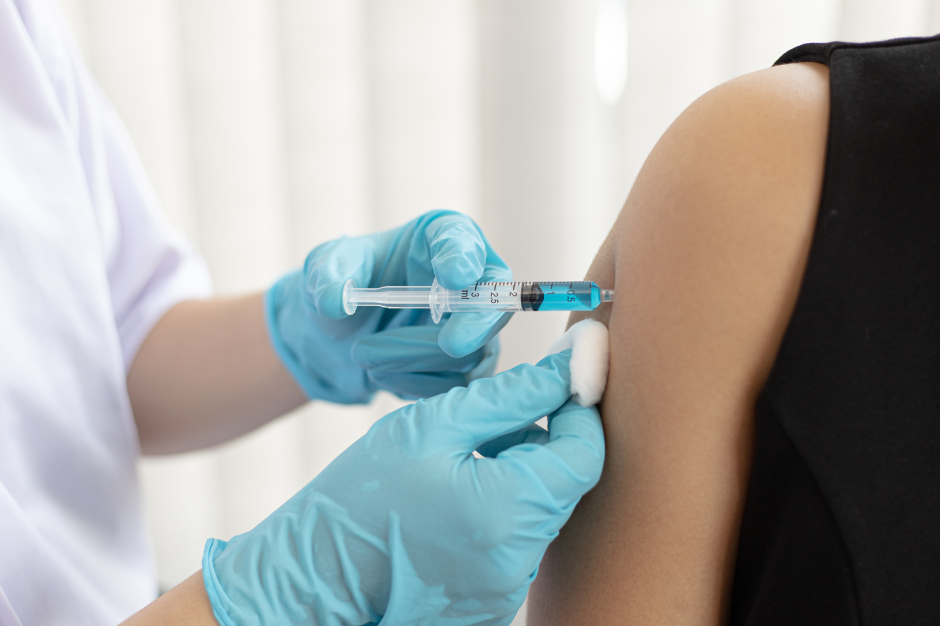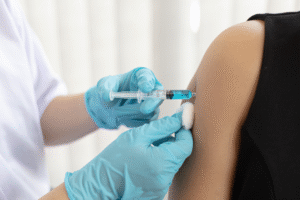
Travelling abroad offers plenty of new sights and cultures. But before packing your bags, it’s essential to check if your destination puts you at risk of diseases not common in the UK. Many countries require or strongly recommend specific vaccinations to keep travellers and local populations safe.
Failing to get the right vaccines can not only risk your health but may also stop you from entering certain countries. This guide highlights the most important travel vaccinations UK travellers should consider before flying out. We’ve also included when to get them, where to book appointments, and how to plan for possible side effects.
Why Travel Vaccinations Matter
While the UK has strict vaccination programmes, other countries still face outbreaks of preventable diseases. Travellers can get infected through food, water, insect bites, or contact with infected people. Getting vaccinated helps your body fight these threats before they can cause serious illness.
A travel vaccine pharmacy can help you understand which vaccines apply to your trip, especially if you’re visiting multiple regions with varying health risks.
When to Book Your Travel Vaccines
The NHS recommends seeing a travel health specialist or GP at least 6 to 8 weeks before your trip. Some vaccines need multiple doses spread out over time, and your body may need a few weeks to build immunity. Last-minute appointments might limit your options or leave you unprotected during your journey.
Key Travel Vaccines You May Need
The vaccines you’ll need depend on where you’re going, how long you’ll stay, and what you’ll be doing. Below are the most commonly recommended travel vaccinations for UK travellers.
1. Hepatitis A
-
Transmission: Contaminated food and water
-
Risk areas: Africa, Asia, Central and South America, Middle East
-
Vaccine schedule: One dose provides protection for about a year. A booster after 6-12 months extends it to 20 years.
Hepatitis A causes liver inflammation and spreads easily in places with poor sanitation. Even short stays can carry risk, especially if you eat local street food or drink tap water.
2. Hepatitis B
-
Transmission: Blood and bodily fluids
-
Risk areas: Asia, Africa, Eastern Europe, and South America
-
Vaccine schedule: Usually three doses over 1 to 6 months
Hepatitis B can lead to long-term liver problems. The risk increases for travellers getting tattoos, undergoing medical procedures, or engaging in unprotected sex abroad.
3. Typhoid
-
Transmission: Contaminated food or water
-
Risk areas: South Asia, Africa, parts of South America
-
Vaccine schedule: One injection or oral capsule; booster needed every three years
Typhoid fever causes high fever, weakness, and abdominal pain. It’s more common in areas with low hygiene standards. Avoiding uncooked foods and unsafe water helps, but vaccination adds a crucial layer of defence.
4. Rabies
-
Transmission: Animal bites or scratches
-
Risk areas: Asia, Africa, Central and South America
-
Vaccine schedule: Three injections over 3 to 4 weeks; boosters may be required for long-term travellers
Rabies is fatal if untreated. Immediate access to medical care may be limited in rural areas. Travellers spending a lot of time outdoors or around animals should strongly consider this vaccine.
5. Yellow Fever
-
Transmission: Mosquito bites
-
Risk areas: Sub-Saharan Africa, South America
-
Vaccine schedule: Single dose; usually provides lifelong protection
Many countries require proof of yellow fever vaccination as part of entry requirements. You must carry an International Certificate of Vaccination or Prophylaxis (ICVP) as proof. Only registered Yellow Fever Vaccination Centres in the UK can issue it.
6. Japanese Encephalitis
-
Transmission: Mosquito bites
-
Risk areas: Rural parts of Asia and the Western Pacific
-
Vaccine schedule: Two doses, 28 days apart
Though rare, Japanese encephalitis can cause brain swelling and long-term complications. Risk increases during long stays in rural or farming areas, especially in the rainy season.
7. Cholera
-
Transmission: Contaminated water or food
-
Risk areas: Parts of Africa, Asia, and the Caribbean
-
Vaccine schedule: Two oral doses taken one to six weeks apart
Most people can avoid cholera with clean food and water, but aid workers, backpackers, and visitors to high-risk areas may benefit from vaccination. The oral vaccine provides short-term protection.
Related Blog:- The Complete Guide to Travel Vaccinations in Leicester
8. Meningococcal Meningitis
-
Transmission: Airborne droplets
-
Risk areas: Sub-Saharan Africa (especially during dry season) and the Middle East (especially during Hajj)
-
Vaccine schedule: Single dose, lasts around five years
Some countries, like Saudi Arabia, require proof of this vaccine for visa approval during religious pilgrimages. The illness can develop quickly and become life-threatening within hours.
9. MMR (Measles, Mumps, Rubella)
-
Transmission: Airborne and close contact
-
Risk areas: Worldwide, especially areas with low vaccination rates
-
Vaccine schedule: Two doses, usually given in childhood
Due to outbreaks in parts of Europe, Asia, and Africa, adults without full MMR vaccination may need a booster. Check your NHS records to confirm.
10. Tetanus, Diphtheria, and Polio (Td/IPV)
-
Transmission: Wounds, airborne, and contaminated food or water
-
Risk areas: Worldwide
-
Vaccine schedule: Booster every 10 years
Most people in the UK receive this in childhood, but you may need a booster before travel, especially if you’re heading to areas with poor healthcare systems.
Where to Get Travel Vaccinations in the UK
You can get many travel vaccinations through:
-
Your GP: Some vaccines are free on the NHS, including Hepatitis A, Typhoid, and Td/IPV boosters.
-
Travel Clinics: Offer a full range of paid vaccines and expert advice tailored to your itinerary.
-
Pharmacies: Boots, Superdrug, and other chains provide quick appointments with travel health nurses.
Synergy Pharmacy provides travel health consultations, same-day bookings, and access to a full range of travel vaccines, including Yellow Fever, Rabies, and Japanese Encephalitis. Their pharmacists can also help you plan antimalarial treatments and offer advice tailored to your travel itinerary.
Always check costs in advance. Some vaccines can be expensive and may not be covered by insurance.
Costs to Keep in Mind
Here’s a rough estimate of private vaccine prices in the UK (as of 2025):
| Vaccine | Approx. Cost (per dose) |
|---|---|
| Hepatitis A | £60–£70 |
| Hepatitis B | £40–£60 |
| Typhoid | £30–£40 |
| Rabies | £55–£80 |
| Japanese Encephalitis | £90–£110 |
| Yellow Fever | £70–£90 (includes ICVP) |
| Cholera (oral) | £40–£60 |
| Meningitis ACWY | £50–£70 |
Prices can vary between clinics. Some packages offer discounts for multiple vaccinations or group bookings.
Tips for a Healthy Trip
-
Carry proof: Keep your vaccination records with your passport.
-
Plan early: Some vaccines need time to become effective.
-
Pack wisely: Bring insect repellent, hand sanitiser, and any prescribed antimalarial tablets.
-
Check entry rules: Some countries have specific vaccine entry requirements.
Key Takeaways
-
Book your vaccine appointments 6–8 weeks before your trip.
-
Vaccination needs vary based on destination, duration, and activity.
-
Some vaccines are mandatory for entry into certain countries.
-
Many travel vaccines are not free on the NHS.
-
Always bring proof of vaccination, especially for yellow fever and meningitis.
FAQs
1. Which travel vaccines are free on the NHS?
The NHS typically provides Hepatitis A, Typhoid, Td/IPV booster, and sometimes Cholera for free if they are medically necessary for travel. Others like rabies or yellow fever are only available privately.
2. Do I need travel vaccines for Europe?
In most cases, no. But some Eastern European or Balkan regions may carry risks such as rabies or tick-borne diseases. You should still check travel health advice for your specific destination.
3. Can I travel without getting vaccinated?
It depends on your destination. Some countries require proof of vaccination for entry, especially for yellow fever or during religious pilgrimages. Skipping vaccines also puts you at risk of serious illness abroad.
4. Are travel vaccines safe?
Yes. The vaccines recommended for travel have been widely tested and used for years. Some people may experience mild side effects like soreness, fever, or fatigue, but serious reactions are rare.
5. What if I’m pregnant or have a medical condition?
You should speak to your GP or a travel health specialist. Some vaccines may not be recommended during pregnancy or for people with weakened immune systems, but alternatives or precautions may be available.
Enjoyed the Read? Share It!


